
I was born in Leeds. My mum grew up in West Yorkshire and her parents now lived in a place called Morley. Like lots of the towns in this particular bit of the world, it is an ex-industrial zone. It’s not a mining town, though of course you’re never too far from a mine. In fact the main source of work used to be textiles, but now the role of big employer was up for grabs.
When we moved back to the UK, we had to move in with my maternal grandparents, Granny and Granddad. We had no money. America had not been the financial success my parents had hoped and so the Stones had to return empty-pocketed and reliant on familial generosity. When moving back, I didn’t feel sad to leave America but it certainly didn’t feel like moving home. I was excited to be much closer to all my family but it was impossible not to feel the waves of deflation radiating from Wizzy and Adoo. This was not at all the life they wanted for us. Living with my grandparents had been a temporary plan which dragged on for two years, much to my parents’ horror. They were both living in a state of emergency.

Granny and Granddad had the space; they had bought two Victorian semis when my granddad’s entrepreneurship had one (fleeting) successful patch. They knocked down the walls between them to make a double residence, like a Kit Kat. They had five children and enough rooms for everyone. When I think of that building on Westfield Place, I see it sliced open like a doll’s house. The house had these long corridors and two sets of stairs for each floor, which really made games of catch very exciting. There were attic rooms and a pair of basements. One was a creepy storage room and the other the children’s telly room. There was a grassy sloping back garden with one wall backing onto a Morrisons and a front garden paved in terracotta chess board slabs. The kitchen was bright yellow and there was an Ikea print of Kandinsky’s circles. I used to look at it and be reminded of Cape Town; it looked like something one of the kids at the Children’s Studio would have made. In the dining room there was a huge table, big enough to fit grandparents, five children, husbands and wives and five grandchildren. We didn’t all live there at the same time but almost all of the Aldridges were in the area, in and out.

While it had a high emotional cost for my own parents (as it inevitably would, moving back as an adult), living with Granny and Granddad was fun for me and Casius. They are consummate hosts and food is their weapon of choice. They cook big delicious meals. Vats of sweet and sour with huge chunks of pineapple and slabs of their own version of lasagne, Spaghetti Pie. Tatty scones and pancakes and Eccles cakes all whipped up with ease. We all sat round the long table with oil-cloth covering, forming a production line filling and folding spring rolls. After tea (dinner), there was a whole drawer of sweets you could dip into. You were never more than three metres from a Tunnock’s caramel wafer or teacake in that house. My belly got round and a sweet tooth was cultivated.
Not only were they great at feeding, my grandparents had Sky (aftermath from Granddad’s flash-in-the-pan business success). We went from no telly to 300+ channels overnight. Miracles do happen. The kids’ living room was combined with the TV room in the right-hand-side basement. The brown shag carpet, exposed brick and slightly dark, damp feeling might have made it a weird place but the big telly more than made up for any of that. Lined along the walls, someone had built shelves for what looked like to me the most impressive video collection I’d ever seen. All the Disney films one could wish for and then the classic musicals, West Side Story and My Fair Lady.

After school we would run down and watch telly for hours. Cas needed more than me. He would wake up at 5 a.m. and sneak into the basement to get in some solid viewing hours of Digimon and Yu-Gi-Oh!. I much preferred films; I liked the wholeness of the stories. They also didn’t just have a video player but on special occasions the whole family would curl up on the multiple sofas in the basement to watch a laserdisc. They had the other original Star Wars and so only then in Yorkshire did I get to finish the trilogy. The medium felt perfect, futuristic and yet of the past.
I was still an obsessive story consumer. I listened to my cassettes again and again. But I only had a limited number of them so I had to read more actual books. Michael Morpurgo, Jacqueline Wilson, Anne Fine and my mum’s old copies of Enid Blyton books. I’d be put to bed and after I’d heard the responsible adult’s steps quieten down, the light would be flicked back on. I would read for a couple of hours and then pad down three flights of carpeted stairs, claiming I couldn’t sleep. I don’t think anyone believed that I had childhood insomnia.
We had returned to the UK at the end of the summer, so we were just in time to start afresh in the academic year. I was supposed to start second grade in America but here I had to enter into Year 3. Being an August baby, I was the youngest in the year. Not that it really mattered, in a photo taken of my class in an assembly I am a head taller than anyone else. Because there were two primary schools in the area, we got to pick which one we wanted to go to. Either the one which my mum had attended twenty years earlier or the one which my cousins were already at. Having heard stories of my mum being teased and the prospect of pre-made friends, we picked to go to Morley Victoria.

It was a third type of different, nothing like the two schools before. The classes were huge, they had to squeeze me into Miss Hagen’s group of thirty-five. The school weren’t pleased. I had to wear a uniform for the first time: a little jumper and polo shirt, skirt and shoes. I finally got to look the part. In this school, everyone seemed to be poor and white, just like us. My parents weren’t even the youngest and there were a solid handful of us living with grandparents. Most of us were on free school lunches, queuing up for turkey twizzlers, chips and chocolate custard. In many ways it felt like I resembled lots of the other kids, but they didn’t see it that way. Obviously the rest of the class hadn’t already lived in two other countries. Most of them didn’t have passports. While my voice was an international mishmash, they all had broad Yorkshire voices with an accentuation which made them sound like old men in flat caps. But after flitting about, being the new kid felt normal to me. I was able to talk to anyone and – let’s not pretend – I loved the attention. So the first few weeks were fun and exciting.


Because the teachers weren’t sure what level I was working on I started in all the bottom ability groups. I had to read all the baby books and prove mesen (which is how you say myself in that particular corner of West Yorkshire). They were impressed, all that extra help I had received in America had made a huge difference. It is not hard to imagine how easily I could have disappeared among the kids who struggled had I not received such targeted help early on. But here, I was no longer behind. I was a very keen, if not always accurate, reader. But writing was a very different thing. I could put together a sentence; well, I think I could. But the problem I had was with spelling and handwriting.
I couldn’t really work out how to tell the difference between a b and a d. They looked so similar to me. I knew they made different sounds but I couldn’t quite work out a way of discerning which way round they went. In spelling tests, I was stumped by a whole variety of sounds. I would try to get around it by making my letters look like they could be various different things. I would draw the stem of the mystery b/d in the centre and hope the teacher wouldn’t notice (they did). But instead of taking this as any particular sign of difficulty with language processing they would just tell me it was weird:
It’s so weird, you read so much but it just doesn’t correlate with your writing.
It’s so weird, you’ve got such a good vocabulary but you can’t spell.
It’s so weird, you work hard but…
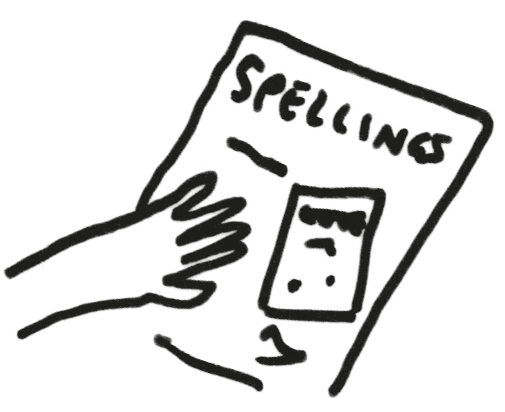
My mum and I would practise for those spelling tests for hours. Covering and writing. Covering and writing. Repetition. Repetition. Evening after evening. Then it was times tables. I found it all mind-numbingly boring. I just picked up on patterns for both. I noticed the digits for answers in the nine times table added up to nine; that saved me some time. When I asked my mum how to spell words, she would have to write it out to see what ‘looked right’. So that’s how I learnt to spell, by looking at how words formed on a page, like a picture. I learnt that school had a rogue h in it, I learnt to recognise that because and beautiful had an odd collection of vowels in them. I would recite the mnemonic or the rhyme as I went around the house with a slice of buttery toast in my paw.
So we would just practise for hours, thinking nothing of it. I did it because there wasn’t an alternative and I was a relatively compliant student. I liked school and work. I wanted to do well. In many ways, school was easy because I read at home all the time. I had ideas and I liked drawing and making things. At its best, that is what primary school is really.
None of us knew what was normal or what was weird. I was my parents’ first kid. My grandparents hadn’t exactly been keen on education when it came to their own children. I think that lots of adults have had such a horrific time at school that when it comes to their own children they don’t want to even think about it. I heard tales of my granddad hating school, getting beaten and ridiculed – just like Roald Dahl in Boy, I thought to myself. People in my family didn’t go to university. You did vocational training (my granny had been a nurse) or you left school at sixteen. My uncle Irvin had been doing badly in school and so Granddad had just sent him to Germany to learn the hotel business from a friend of his instead of sitting the equivalent of GCSEs. My mum left school very unceremoniously the moment she could tell the teachers to fuck off. My dad scraped together two O-levels and a BTEC. But they knew from struggling in London, and seeing just who got to make art and be successful, that education was the key. Their children would be different and I loved school, so they would do everything they could to make sure I got to take advantage of learning. At the time, it never felt like any pressure but there is no way to escape that my parents always worked incredibly hard, and they had big ambitions for me. I didn’t ever think they were wrong.
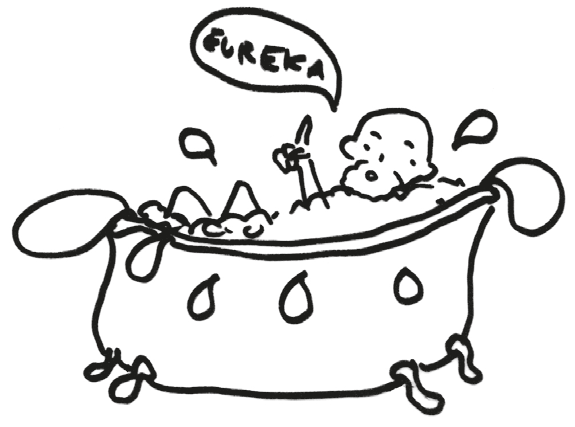
There were a few notable instances in my first primary school. We visited Eureka!, a science museum with a raised moving water feature of Archimedes getting into the bath. As he dipped in the bath, water would cascade out. It was a manic day trip: we climbed through huge body parts and put our hands in dark holes and tried to guess their contents. The final exhibit was a kid-size adult world with a bank and mechanics. The supermarket was an M&S, which I thought was very posh. I’d never been in a real one before. The highlight was the system of air tubes which connected all the various parts of the town. We shoved piles of fake cash in what looked to us like clear Pringle cans and screamed as it hoovered our secret messages away. For school trips my dad would make me an extra special packed lunch with a cake bar, chocolate mousse, fruit winders and crisps. I was properly fuelled for the excitement, and this is what I imagined being rich was like.
I reached my personal apex in 2001/2002. There was a general election and the school decided that we would have our own. Each class had to form a political party, make some manifestos and choose leaders. I volunteered myself and gave a speech in front of the whole school, promising a climbing wall and tarmac art. We filled the voting booth and marked Xs on ballots. The count was in and we won. Unfortunately, my politics career was short-lived, but the modular climbing holds are still drilled on the low wall nearly twenty years later.
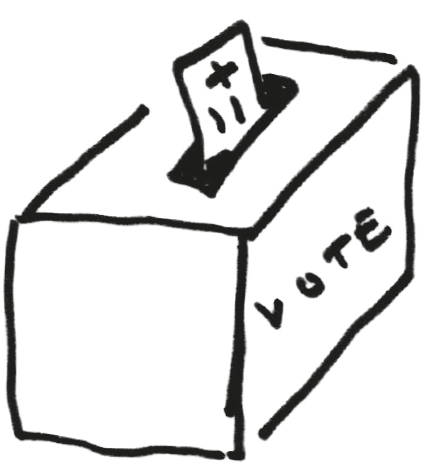
Then there was the World Cup. Teachers rolled the telly on wheels into the hall and we sat cross-legged on the cold floor in our plimsolls. I watched, wondering what all the fuss was about. We had a sweepstake and I pulled Sweden and Brazil. I cheered on the Swedes and was disappointed to have my favourites knocked out. When Brazil won, I graciously received my prize, a rubber with the country’s flag on.
The year ended on another high: Queenie’s Golden Jubilee. Fifty years on the throne. The school threw a party and there was bunting everywhere, foreshadowing its terrible resurgence a decade later. But before the godawful Keep Calm posters came to ubiquitous power, my school opened up a competition to design the school’s logo to celebrate this great monarchist feat. I won, and my logo was put on fake leather bookmarks that every student got. With hindsight, I wonder where all the money for this memorabilia came from because there didn’t seem to be enough money for anything else.
While I have lots of memories of wonderful events, this time was significant for also marking the start of a slow unravelling of my innocence. I began to see the world as a big place, even bigger than just the places I had lived and the people that I had met. I became obsessed about the Holocaust after studying the Second World War and evacuation. It’s odd how in primary schools we study this period all cheerfully with talk of baddies and rationing. We sing ‘Pack Up Your Troubles’ and crawl into bomb shelters. But is it really suitable for eight-year-olds? Especially the obsessive sort who will go on to read about Anne Frank and then how people were rounded up and gassed. I couldn’t understand how it happened, the scale of it, and I began to understand how the world was full of potential for real cruelty. While I had recurring nightmares about being smuggled out of Nazi Germany sewn into a mattress, teachers encouraged us to imagine having baths in five inches of water.

I survived my own morbid thoughts by reminding myself that that was in the past. But, one day, I was collected from school by my aunt and she looked funny. The radio was on and there was no music, just talk of planes. At home we sat around the TV in the basement and we saw the second aircraft collide and the towers folding in on themselves and crumple to the ground. It had been my first week in my new school. I had been up to the top of the World Trade Center just before we left America. The height had made my belly tingle and now I knew that no one could stand, looking down on the streets below, like I had just months before. It didn’t take much to erase a hundred floors from the skyline. Everything was fragile.
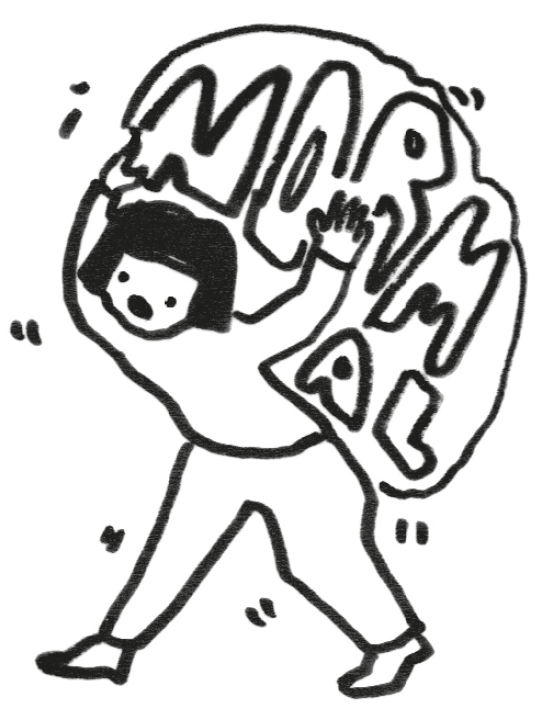
Later came something else new – moments of shame. Unwillingly, I became aware of other people’s opinions of me and how that could make me feel hot and sick and small. I began to realise that people didn’t like me. I was told that I was odd. We all are really, but I hadn’t previously been aware of my own oddity. I just believed that everyone wanted to be my friend, that the baseline of all our interactions was sweet kindness. Like most children, I was preoccupied with justice and fairness. But then came a barrage of comments which undermined that belief. After I had my hair cut for the first time in a hairdressers’, I was mocked the next day in school for being excited about having layers. Apparently, I was years behind the rest of the girls. All the other times I’d had my hair cut by my dad at the kitchen table. He had worked for three days sweeping up hair aged sixteen, thus making him the most qualified parent for this job. So I learnt that a professional haircut with layers was nothing worth speaking about. I was left out of games. I wouldn’t be invited to parties. I just couldn’t work out what made me so different and worthy of singling out.
Only occasionally were the teachers less cruel. I can’t recall the specific words they said to me but what I do remember is the hot flush of embarrassment. I remember exactly where I was sitting each time a comment was made. On the left leg of the horseshoe table. In the back corner under the clock. Focusing on my exercise book. Staring at a poster of times tables in primary colours. Blinking back tears. My mum wrote letters that got no response: I don’t believe humiliation is a suitable technique for educating our children.

I was OK at following rules. But I would get stuck on certain steps of education. I just couldn’t get my pen licence. Firstly, nothing is more ridiculous than the idea of a pen licence. We let people own animals, have kids and join the army but we don’t allow children to stop writing in pencil and move onto pen without teacher’s permission. I watched on longingly as all the lovely nice blonde girls around me with neat cursive got their certificates and moved on to those red Berol handwriting pens. My scrawl couldn’t get past the eagle eyes of the teacher. I was left behind with the boys that threw things around the class. It made me feel like shit, like I was shit. I would write in pen at home in secret, certain that if I was caught I would be expelled from school. All I wanted was to be allowed to make permanent marks. Pencil smudges and fades but a biro is forever, as many of my white shirts can attest to.
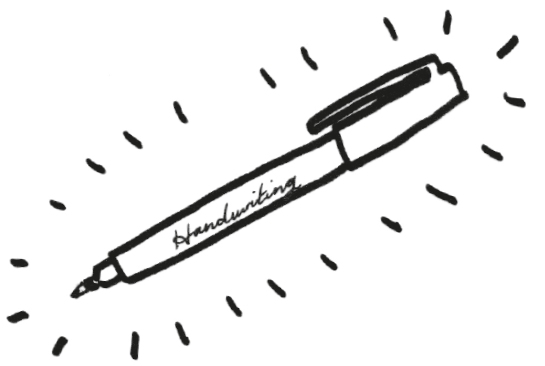

After my mum went away without us for the first time ever, she brought me back a present: a fountain pen. I couldn’t believe it. It was so magical, with its metal nib and cartridges. The clip on the lid was gold and formed an arrow at its point. I felt like the old lawyer in The Aristocats twisting it open and closed to refill the ink. I knew I could write anything with this pen. But just not in school. I was notably upset that I had the greatest weapon in the world but that I had to leave it at home as I left each weekday. My mum asked why I wasn’t using it. I wailed that I still didn’t have my licence. I had let her down.
Of course, she was having none of that sort of talk from me and sent me off to ask special permission to use it in lessons. The teacher said she would think about it. After two days of deliberation, the licence committee must have decided that if this nine-year-old was that bothered about writing with a pen it was probably easier to just let her. I never did officially get the licence (and it was a beautiful certificate: A5 yellow card, emblazoned with Curlz MT), which proved to me that it was all bullshit.
After a couple of years, we moved out from my grandparents' house, which meant a change of school. Again, I was squeezed into the class. Pushing the rules to let me in, pupil number thirty-six. A class with four Jacks, three Bens and two Ellies but just one Kaiya. One girl made my life hell. She lied, would tell people I spread rumours, she claimed I stole things from her. I kept asking my mum: why doesn’t she like me? I haven’t done anything to her. Why? At the end of the year, she invited me to her birthday party, an elite affair with only five guests. She cried when I left the class and asked me to stay in contact. It melted my mind. She had just wanted to be my friend all along. People are weird.

In Year 6, in my third and final primary school, as a leavers’ present the teachers had a personalised mug made for our year. We all drew ourselves and it was printed on the cup. Most people will be familiar with this – it’s usually tea towels – but what ten-year-old has any use for a rag to wipe up surfaces? We got given tiny postage-stamp-sized pieces of paper and were instructed to make our self-portrait snappy. The black pens they gave us were too wide. I tried to capture my distinctive features. My hair was long, like all the girls in my class, so that wouldn’t distinguish me at all. But I have a mole above my lip, like Marilyn Monroe or Mutya from the Sugababes. I drew myself and then realised I had to put my name on the picture. I scribbled my name as if it was pouring out of my head. When I handed it in, one classmate pointed out that I looked like a witch. Strike one, I noted. I saw that everyone else had neatly printed their name under their drawing. Strike two. The teacher frowned very slightly when I handed it in. Strike three. I was mortified. Why couldn’t I just do things the right way like everyone else? It was another reminder by the world that there was some unmentioned code of being that seemingly had been programmed into everyone else and here I was having to play along when I didn’t even know the name of the game. It was frustrating and it made me sad.
Now that mug sits in the family bathroom, full of old toothbrushes that no one is entirely sure who they belong to. When I first got it I spun it round so my drawing was facing the wall. Now I like it. It is a symbol of how my brain works differently to most people’s. At least, it’s original. When I go home, I pay homage to witchy Kaiya with her own name pouring out of her head like Athena bursting out of Zeus’ skull.
While I was getting taught about space and Henry VIII in school, I really got my proper education from my parents at home. In fact, my dad and I had a rule. If I could answer all his questions correctly, I could leave school forever. Obviously, this was a great ploy because he only posited questions that I would never learn the answers to in the confines of a classroom. Who invented reggae? How do computers work? Who was the first man on the moon? (That last one is a trick question; he considers Tintin’s moon landing in the 1953 book takes precedence over the 1969 copycat mission.) I quickly realised that I would need to do a lot of work outside of school because there was so much I wasn’t learning there. If only I had been born ten years later. Wikipedia could have broken me out of my educational bondage.
It was with my family that I learnt the power of storytelling. As poor people, the Stones had a lot of shit cars. You won’t believe the number of childhood hours I spent in lay-bys. The Ford Focus will forever be a symbol of luxury travel. But before we got the Focus, we had a white Golf and the radio didn’t work. Growing up, we lived pretty far away from my many, many relatives. Nana and Beardie lived four hours away near Bath and Jayne and the Boys were all the way in the thatched-cottaged Cotswolds. So we would regularly have to make a three-plus-hour drive to visit them.
In our filthy silent car, Cas and I would demand stories from my dad. The ones from his childhood were best. When he was naughty, or his parents were evil, or about music and computers from another time. But the best was the story about his granddad (Beardie’s father). I’d met him once, in an old people’s home. He was wrinkly and I was clearly an unobservant infant because that’s all I remember.
Now, there is really only one story about my great-granddad. It is set in the late 1970s, my dad is nine and on holiday with his family, grandparents included. My great-granddad was a proud old poshie. He’d got a medal from the Queen, which proves it. They were staying in a hotel which may have been in Crete but more likely was some shit beach town in England that was ‘quite sufficient’. The hotel had a pool on the roof, which to me hearing this story sounded like the height of sophistication – to be honest it still does.
The story goes that my great-granddad, Gordon, went up to the pool where my dad was already playing and, as he got out of the lift, my dad saw that the old man’s gonad had popped out of his Speedos. That logically meant he’d been hanging out, shall we say, for the whole journey from his room to the rooftop, via a shared lift. My dad describes nearly pissing himself and being shushed by his parents and no one saying anything! Everyone politely averting their eyes from the singular wrinkly ball that had escaped like a smuggled sprout from a child’s plate.
What happened? When did he realise?
The story is that apparently he didn’t. He jumped into the pool, had a swim and when he got back out the offending knacker had been popped back into the old man’s Speedos.
Now, I can’t tell you how many times I’ve heard that story. It was a childhood myth, the stuff of real legend. I’m sure it’s partly because it involved laughing at various words for testicles – balls, knackers, bollocks, gonads, etc. Maybe it was that this had happened to a rather un-humorous old man.
Oh and Gordon is a funny name because in the 1970s there was a comedy hit single called ‘Gordon is a Moron’. My dad, aged eight, was singing the main refrain GORDON IS A MOOOORON – dancing around in his flares and wide-collared t-shirt, only to find his stern and rather angry grandfather standing behind him. Let’s just say, Gordon dropped a bollock on more than one occasion.
Either way, the important thing is that there are stories that transcend human time and suffering, that bring serious and titled men to their knees (or at least can bring their serious and titled balls to their knees) and you can tell them without writing them down. Storytelling was a currency I was brought up with, and not just for car journeys. We tell each other about our days like we’re recounting historic battles and we reminisce about things that happened long ago. I knew my father was a writer long before he ever published his first book because I had heard him for my whole life either telling us his own adventures or making up characters that did outrageous things.
Telling stories is a very human way of softening the blows of living: it made long car journeys fun for me and Cas; for my parents, I think it took the edge off driving to see old moody gits who disapproved of their life choices.
I will no doubt tell that story of my great-granddad to my children, maybe they will pass it down further – and essentially that’s how all myths were invented. That’s why Homer was not one man but many, many storytellers, and why writing isn’t about spelling and grammar and pen licences.